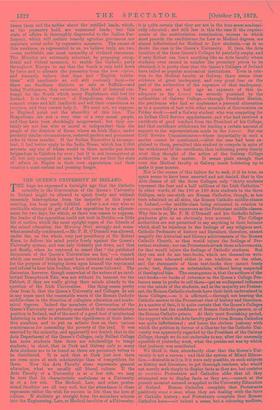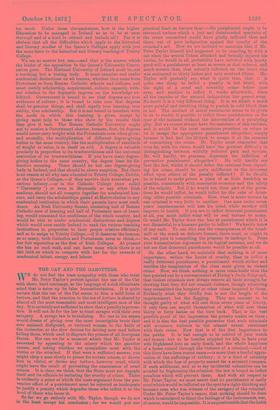THE QUEEN'S UNIVERSITY IN IRELAND.
THE hope we expressed a fortnight ago that the Catholic minority in the Convocation of the Queen's University in Ireland might be allowed to speak freely and without unseemly interruptions from the majority at this year's meeting, has been partly fulfilled. After a not very wise or creditable attempt to get rid of the opposition by an adjourn- ment for two days, for which, as there was reason to suppose, the leader of the opposition could not wait in Dublin,—a little bit of tactics, which the most upright organ of the friends of the mixed education, the Morning Mail, strongly and some- what scornfully condemned,—Mr. F. H. O'Donnell was allowed, under the, on the whole, very just presidency of Sir Robert Kane, to deliver his mind pretty freely against the Queen's University system, and was only violently put down, and that not finally, when he ventured to assert that "the published documents of the Queen's Universities are lies,"—a remark which one would think he must have intended and calculated for the purpose of bringing down upon himself the reprimand and refusal to hear him farther, which of course followed. The discussion, however, though somewhat of the nature of an intel- lectual Donnybrook Fair, was not without its interest for the Cabinet, if they are really giving their minds already to the question of the Irish Universities. One thing seems pretty clear from it, that the Queen's University and Colleges do not in any sense meet the reasonable wants Of the Roman Catholic middle-class in the direction of collegiate education and acade- mical degrees. Indeed the members of Convocation of the Queen's University are perfectly sensible of their unsatisfactory position in Ireland, and of the need of a good deal of intellectual bolstering in order to attenuate the significance of their defec- tive numbers, and to put an artistic face on their various contrivances for concealing the poverty of the land. It was asserted by the minority, and apparently not denied, that in the Arts Department of the Queen's Colleges, only Belfast College has more students than there are scholarships to tempt students ; in short, that in Cork and Galway only as many Arts students are to be found as there are pecuniary bribes to be distributed. It is said that at Cork just now there are even more of each scholarships than of competitors for them. Now the Arta Faculty alone represents general education, what we usually call liberal culture. If the Arts Faculty of a University is at a low ebb, we may be sure that its characteristic usefulness as a University is at a low ebb. The Medical, Law, and other profes- sional faculties are all very well, but the attendance in these represents rather the wish for success in life than the love of culture. If students go straight from the secondary schools into the Engineering, Law, or Medical faculties of a University, it is quite certain that they are not in the true sense academi- cally educated ; and still less is this the case if the require- ments of the matriculation examination, success in which must precede the candidature for Law or Medical degrees, are almost infinitesimal for Medical or Law students,—as is no doubt the case in the Queen's University. If, then, the Arta faculties of the three Queen's Colleges be painfully empty, and if only Belfast can boast anything like an Arts faculty whose students even exceed in number the pecuniary prizes to be obtained, it is pretty clear that the Queen's Colleges of Ireland have failed as popular academical institutions. Even in rela- tion to the Medical faculty at Galway, there seems clear evidence of great inadequacy, and very great fear on the part of the authorities of the exposure of that inadequacy. Two years and a half ago an exposure of this in- adequacy in the Lancet was severely punished by the authorities of Galway College,—through President Bewick, the gentleman who had so unpleasant a personal altercation as to a question of fact with other members of Convocation on Friday week ;—and a Galway student who was competing for an Indian Civil Service appointment, and who had received a certificate of good conduct from the President of his College, had that certificate withdrawn for lending a certain amount of support to the representations made in the Lancet. But our Civil Service Commissioners—whose impartiality in such a matter cannot be questioned,—aftei the case had been ex- plained to them4 permitted this student to compete in spite of the withdrawal of the certificate, thus indicating pretty clearly what they thought of the action of the Galway College authorities in the matter. It seems plain enough that even the Medical faculty at Galway needs bolstering up to make it pass muster.
Nor is the reason of this failure far to seek, if it be true, as again seems to have been asserted and not denied, that in the Arts classes of all the three Colleges, only "thirty students represent the four and a half millions of the Irish Catholics." In other words, of the 180 or 190 Arts students in the three Colleges, only one-sixth are Roman Catholics, though, as has been admitted on all sides, the Roman Catholic middle-classes in Ireland,—the middle-class being estimated in relation to means,—are fully as numerous as the Protestant middle-classes. Why this is so, Mr. F. H. O'Donnell and his Catholic fellow- graduates give us an obviously true account. The College authorities are not permitted to say anything in their lectures which shall be injurious to the feelings of any religious sect. Catholic Professors of history and literature, therefore, cannot magnify the historical and literary achievements of the Roman Catholic Church, as that would injure the feelings of Pro- testant students; nor can Protestants attack those achievements, for that would injure the feelings of Catholic students. But they can and do use text-books, which are themselves writ- ten by men educated either in one tradition or the other, and the statements of these text-books they cannot freely probe, test, dispute, or substantiate, without being suspected of theological bias. The consequence is, that the authors of the text-books--or books of reference as the Queen's College Pro- fessors seem to prefer to call them—get an undisputed influence over the minds of the students, and as the majority are Protest- ant, the Roman Catholic students have their faith undermined in these Colleges,—so it is affirmed,—through not hearing the Catholic answer to the Protestant view of history and literature. As a matter of feet, it is quite certain that the Queen's Colleges have never had the confidence of Roman Catholic parents, or of the Roman Catholic priests. At their most flourishing period, the support which the Arts faculty gained from Roman Catholics was quite infinitesimal ; and hence the obvious jealousy with which the petition in favour of a Charter for the Catholic Uni- versity was apparently regarded by the President of the Galway College, though we do not undertake to say, after the unseemly squabble of yesterday week, what the precise act was by which that jealousy was manifested. We think it, then, abundantly clear that the Queen's Uni- versity is not a success ; and that the system of Mixed Educa- tion,—desirable as it is, if it were only possible, on such subjects as history and literature, to get thorough teachers, who would not merely seek simply to display facts as they are, but contrive to convince Protestants and Catholics alike that all they attempted was to display facts as they are,--cannot at the present moment succeed as applied to the University Education of Ireland. Roman Catholics complain that Protestants positively want a sense when they are dealing with the facts of Catholic history; and Protestants complain that Roman Catholics have—not indeed a sense, but a colouring medium, too much. Under these circumstances, how is the higher Education to be managed in Ireland so as to be at once thorough and of a kind to attract and include all ? For it is obvious that all the difficulties which apply to the historical and literary studies of the Queen's Colleges apply with just the same force to the historical and literary teaching of Trinity College.
We see no answer but one,—and that is the answer which the leader of the opposition in the Queen's University Convo- cation gave. The National University of Ireland must be, not a teaching, but a testing body. It must examine and confer academical distinctions on all corners, whether they come from Protestant or from Roman Catholic schools and colleges, and must certify scholarship, acquirement, culture, capacity, with- out relation to the dogmatic impress on the knowledge ex- hibited. Government is bound to see that degrees are true evidences of culture ; it is bound to take care that degrees shall be genuine things, and shall signify true learning, true ability, true scholarship. But it is not bound to interfere with the mode in which this training is given, except by giving most help to those who show by the results that they give it best. The Roman Catholic University ought not to receive a Government charter, because, first, its degrees would never carry weight with the Protestants even when given; and secondly, the multiplication of different degree-giving bodies in the same country, like the multiplication of standards of weight or value, is in itself an evil. A degree is valuable precisely in proportion to its trustworthiness and the universal conviction of its trustworthiness. If you have many degree- giving bodies in the same country, the degree loses its dis- tinctive meaning. There should be but one degree-giving body in Ireland, and that should be above suspicion. But there is no reason at all why men educated in Trinity College, Dublin, or the Queen's Colleges,—if they survive their somewhat pre- carious infancy,—or in the Catholic College (now called "University ") or even in Maynooth or any other Irish academy, should not all compete together for academical hon- ours, and carry the scholarships gained at Matriculation to any academical institution in which their parents have most confi- dence. An Irish University Senate, consisting half of Roman Catholic men of learning and half of Protestant men of learn- ing, would command the confidence of the whole country, and would be able to confer academical distinctions and degrees which would soon enable Ireland to rank the various teaching institutions in proportion to their proper relative efficiency, and so to assign to Trinity College,—if it deserves the honour, as so many, both Catholics and Protestants, seem to think,— her fair reputation as the first of Irish Colleges. At present she has no such rank, and can have none while there is no fair field on which to compete with her for the rewards of academical talent, energy, and labour.



































 Previous page
Previous page